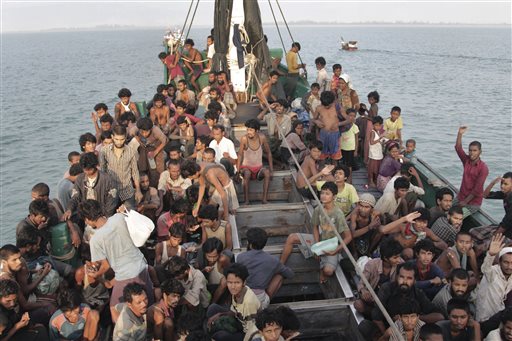
In this Wednesday, May 20, 2015 file photo, migrants wait to be be rescued by Acehnese fishermen on their boat on the sea off East Aceh, Indonesia. AP
Myanmar says its navy has rescued 208 migrants aboard two fishing trawlers off the western coast.
According to the director of the president’s office, Zaw Htay, the migrants are Bangladeshi men.
They were found off the coast of Rakhine state, where most of the Rohingya minority Muslims have been fleeing persecution in the majority-Buddhist nation and thousands became stranded in the Andaman Sea.
Authorities in Myanmar do not recognize the Rohingya, refer to them as Bengalis and consider them to be illegal immigrants from Bangladesh.
About half of the more than 3,000 migrants who landed on the shores of Indonesia and Malaysia are Rohingya from Myanmar and the other half from Bangladesh proper. They share the same language and religion.
Htaw says the Myanmar navy will provide humanitarian assistance, conduct verification and return them to where they came from.
The U.N. refugee agency is estimating that over 3,000 Rohingya and Bangladeshi migrants — or even more — could still be adrift in the Andaman Sea.
The exact numbers are not known, but the U.N. High Commissioner for Refugees says it triangulated reports in the media and other sources and estimates the current number could be over 3,000 — or more that no one knows about.
More than 3,000 Rohingya minority Muslims fleeing persecution in Myanmar and Bangladeshi economic migrants also on the boats with them have already landed in Indonesia and Malaysia, and over 100 in Thailand.
Only Rohingyas are being given a one-year temporary shelter while Bangladeshis face repatriation.
Malaysian navy chief Abdul Aziz Jaafar says four vessels are searching for any migrant ships that could still be out at sea, and three helicopters and three combat boats are on standby.
The U.S. military says it is preparing to help countries in the region address the humanitarian crisis of the Rohingya migrants stranded at sea.
Pentagon spokesman Lt. Col. Jeffrey Pool told The Associated Press Thursday that the Department of Defense “is responding to this crisis and taking this seriously. We are preparing to stand up maritime aviation patrols throughout the region and working with local partners to help with this issue.”
It was the first indication that the U.S. military is ready to take direct role. Washington has been urging governments in the region to work together to conduct search and rescue and provide shelter to thousands of vulnerable migrants.